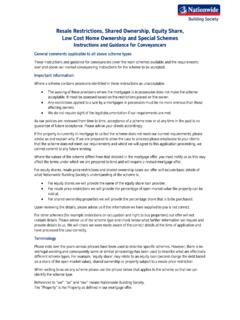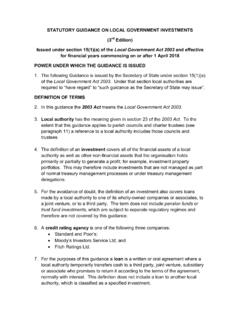Transcription of The Intellectual Property Enterprise Court Guide - GOV.UK
1 The Intellectual Property Enterprise Court Guide Issued July 2019 By authority of the Chancellor of the High Court Contents Updated July 2019 1 Contents 1. General 3 Introduction 3 Multi-track and small claims track 3 Error! Bookmark not defined. Intellectual Property cases 4 Remedies 4 Error! Bookmark not defined. The judges 4 Trials outside London 4 Representation 4 2. Civil Procedure Rules 6 The CPR 6 Abbreviations 6 Rules of particular relevance to the ipec 6 3. The Court in which to bring proceedings 8 The options 8 The ipec or elsewhere in the High Court 8 The ipec multi-track or small claims track 9 4. Procedure in the ipec 10 Before starting proceedings 10 Starting proceedings 10 Service of the claim form 171 Response by the defendant 11 Statements of case 11 Case management 15 Applications 17 Urgent applications 18 The trial 18 Costs 19 Contents 2 Updated July 2019 Alternative dispute resolution 19 5.
2 General Arrangements 21 Filing documens with the Court 21 Court fees 21 Arrangements for listing 21 Time Estimates for applications 21 Documents bundles and skeletons for trials and applications 22 Telephone applications 22 Consent orders 23 Evidence at the trial 23 Draft judgment 23 Order following judgment 23 Enforcement 23 Appeals 24 Information available on the Internet 24 Annex A Contact details 25 Annex B Example CMC Order 27 Annex C Guidelines on bundles 29 The Intellectual Property Enterprise Court Updated July 2019 3 1. General Introduction This is the Guide to the Intellectual Property Enterprise Court (the ipec ). The Guide is written for all users of the ipec , whether a litigant in person ( a litigant who acts on their own behalf without professional representation) or a specialist Intellectual Property litigator.
3 It aims to help users and potential users of the ipec by explaining how the Court s procedures work and providing guidelines where appropriate. The ipec is part of the High Court . It is one of the Business and Property Courts of England and Wales. It hears only cases concerning Intellectual Property . The ipec aims to provide a procedure for Intellectual Property litigation which is speedier and less costly than is the case in the rest of the High Court . It is also designed to safeguard parties from the risk of paying large sums in costs to the opposing party at the conclusion of the proceedings. The intention is to ensure that parties without the benefit of large financial resources are not deterred from seeking access to justice because of the high cost of litigation. Multi-track and small claims track The ipec has two sets of procedures or tracks.
4 They are known as the ipec multi-track and the ipec small claims track . They differ in that the small claims track deals with cases of a simpler nature with a claim for a lower level of damages. In the ipec multi-track, litigants may claim up to 500,000 in compensation for infringement of their rights. This cap on compensation may be waived by agreement of the parties. At the end of the trial the losing party may be required to pay the winning party s legal costs, but with very limited exceptions such costs will not exceed 50,000. The procedure not only caps the overall costs which a losing party will have to pay, it also limits costs payable for each stage of the proceedings. These costs caps limiting the extent of any adverse order on costs form a significant feature of the ipec . The small claims track is for suitable claims in which the compensation sought is no more than 10,000.
5 Generally, at the end of the case the losing party will be required to pay little or none of the winning party s legal costs. There is thus even greater protection from an adverse order on costs in the event that a party is not successful. The procedure in the small claims track is shorter and less formal than in the multi-track, and the Court fees are lower. As of October 2019, there will be district judges based in each of the six Business and Property Court centres out of London, namely Birmingham, Bristol, Cardiff, Leeds, Manchester and Newcastle, who will be able to hear matters in the ipec small claims track. Such matters can be issued using the Business and Property Courts electronic filing system (see Annex A). Appeals from decisions in the ipec small claims track will be filed at the relevant appeal centre indicated in Practice Direction 52B (see section of this Guide ) and a judge of the multi-track will be made available to hear the appeal, whether locally or in London depending on the circumstances of the case and on judge availability.
6 Guidance is given below as to whether the multi-track or small claims track is likely to be the more appropriate forum for a dispute. The Intellectual Property Enterprise Court 4 Updated July 2019 The focus of this Guide is the ipec multi-track. In the remainder of the Guide , unless expressly stated otherwise the ipec will mean the ipec multi-track. Guide to the ipec small claims track There is a separate Guide for the ipec s small claims track, available at Intellectual Property cases The ipec hears Intellectual Property cases of any kind. For the most part this means cases concerning patents, registered designs, unregistered designs, trade marks, passing off, copyright, database rights, performance protection rights, trade libel and breach of confidence. There are other Intellectual Property rights less often relied on, such as moral rights, semiconductor topography rights and the protection of plant varieties, and all of these may also be litigated in the ipec .
7 The ipec deals with disputes which involve matters other than Intellectual Property , such as contractual claims, but only if associated with an Intellectual Property claim. Remedies All the remedies available elsewhere in the High Court can be claimed in the ipec . These include preliminary and final injunctions, orders for the payment of damages or an account of profits, the latter being an order that a defendant found to infringe should disclose and pay over the profits made from the infringement. Search and seizure orders, asset freezing orders and orders requiring the dissemination of a judgment (such as publication on a website) may also be granted in the ipec . The judges The Presiding Judge of the ipec is a specialist circuit judge. Nominated barristers and solicitors, all experienced in Intellectual Property law, sit as deputy ipec judges.
8 Judges who sit in the Patents Court also sit in the ipec when the need arises. Trials outside London Particularly where it would save costs, ipec trials will be heard outside London. If the parties wish the trial to be heard at a place other than London, they should contact the clerk of the Presiding ipec Judge as soon as possible so that arrangements can be put in place well before the date of the proposed hearing. (Contact details are given at the end of this Guide .) Before making such an approach, the parties should discuss this between themselves. If there is disagreement between the parties as to where the trial should be heard, an application should be made to the Court to resolve the matter. Parties should be aware that generally a trial will not be heard outside London unless the parties are able to agree on an alternative location.
9 Subject to very limited exceptions, ipec judges will not sit outside London for applications, including case management conferences. This is because it is impractical for a short hearing. However, applications may be heard by phone or may be resolved in writing by the Court without any hearing, subject to the approval of the judge. The Intellectual Property Enterprise Court Updated July 2019 5 Representation A person may represent themselves in litigation in the ipec as a litigant in person . However, Intellectual Property disputes can be complex and litigants will often benefit from the assistance of a professional representative. Solicitors and patent and trade mark attorneys1 are all entitled to represent clients in the ipec . These professionals may additionally instruct barristers to help prepare the case and/or to argue the case in Court .
10 In some instances, a barrister may accept instructions directly from the public. Each of these professions has its own qualifications and a particular set of skills. It may be appropriate to instruct more than one legal representative to act as a team. A company or other corporation may be represented at trial by an employee, whether or not the employee is director, provided the employee has been authorized by the company and the Court gives permission, see CPR Part 39 rule 6. IP Pro Bono Where a person bringing or defending a case in the ipec cannot afford to pay for their own legal representative, they may be eligible to seek free or pro bono advice. A scheme has been set up which provides free professional assistance for those involved in Intellectual Property litigation who do not have the resources to pay for advice.













